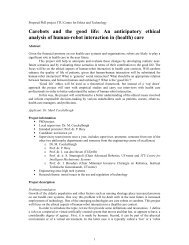Ethical issues in engineering design - 3TU.Centre for Ethics and ...
Ethical issues in engineering design - 3TU.Centre for Ethics and ...
Ethical issues in engineering design - 3TU.Centre for Ethics and ...
Create successful ePaper yourself
Turn your PDF publications into a flip-book with our unique Google optimized e-Paper software.
<strong>Ethical</strong> <strong>issues</strong> <strong>in</strong> eng<strong>in</strong>eer<strong>in</strong>g <strong>design</strong><br />
admitted that it had taken them about 5 years to figure out the regulative<br />
framework <strong>and</strong> the relationships between elements of it; also <strong>in</strong> the bridge case,<br />
the eng<strong>in</strong>eers did not know the regulative framework perta<strong>in</strong><strong>in</strong>g to health <strong>and</strong><br />
safety at construction sites. The eng<strong>in</strong>eers only knew that they had to make a<br />
health <strong>and</strong> safety plan, but they did not know <strong>for</strong> example, whether there were<br />
limits to the mass someone is allowed to lift repeatedly on a build<strong>in</strong>g site. These<br />
examples show that it is problematic to assume that eng<strong>in</strong>eers will learn about<br />
regulative frameworks <strong>in</strong> <strong>design</strong> practice. Eng<strong>in</strong>eer<strong>in</strong>g students should learn the<br />
basics of regulative frameworks: the elements they consist of, the relationships<br />
between these elements <strong>and</strong> the responsible organisations that <strong>for</strong>mulate these<br />
elements. This does not mean that eng<strong>in</strong>eer<strong>in</strong>g students should learn the<br />
content of all the regulative frameworks that they might encounter <strong>in</strong> their later<br />
professional life. If eng<strong>in</strong>eers have a basic knowledge of regulative frameworks<br />
then they are capable of discern<strong>in</strong>g particular details of the specific regulative<br />
frameworks they encounter <strong>in</strong> their jobs. Without such basic knowledge<br />
eng<strong>in</strong>eers will have difficulty establish<strong>in</strong>g what regulations perta<strong>in</strong> to their<br />
<strong>design</strong> processes <strong>and</strong> they cannot take up their responsibility <strong>for</strong> adapt<strong>in</strong>g the<br />
frameworks. The eng<strong>in</strong>eers need this knowledge <strong>for</strong> the public to have<br />
warranted trust <strong>in</strong> eng<strong>in</strong>eers mak<strong>in</strong>g normal <strong>design</strong>s. In my op<strong>in</strong>ion there is no<br />
need <strong>for</strong> a separate course on regulative frameworks. The general outl<strong>in</strong>e of<br />
regulative frameworks could be discussed <strong>in</strong> eng<strong>in</strong>eer<strong>in</strong>g ethics courses <strong>and</strong> <strong>in</strong><br />
<strong>design</strong> courses. Design assignments <strong>in</strong> normal <strong>design</strong> are apt to require<br />
eng<strong>in</strong>eer<strong>in</strong>g students to <strong>design</strong> a product <strong>and</strong> to f<strong>in</strong>d the relevant regulative<br />
frameworks <strong>and</strong> use these <strong>in</strong> the <strong>design</strong>. As I experienced <strong>in</strong> do<strong>in</strong>g the casestudies,<br />
it can be difficult <strong>and</strong> time consum<strong>in</strong>g to list all the relevant EU<br />
directives, national legislation, codes <strong>and</strong> st<strong>and</strong>ards perta<strong>in</strong><strong>in</strong>g to a product (see<br />
sections 5.2, 6.3 <strong>and</strong> 8.6). EU directives are often amended <strong>and</strong> commonly refer<br />
to other EU directives. Search<strong>in</strong>g <strong>for</strong> codes is difficult because codes are not<br />
freely available. Delft University of Technology library has to pay <strong>for</strong> access to<br />
such codes <strong>and</strong>, while the Dutch NEN codes <strong>and</strong> st<strong>and</strong>ards are accessible, most<br />
of the American, German or British codes are not. So there are difficulties to be<br />
overcome when describ<strong>in</strong>g a regulative framework that is relevant <strong>for</strong> a product<br />
<strong>design</strong> but if eng<strong>in</strong>eer<strong>in</strong>g students have had to do this once dur<strong>in</strong>g their<br />
education then it will be easier <strong>for</strong> them to f<strong>in</strong>d, use <strong>and</strong> underst<strong>and</strong> regulative<br />
frameworks <strong>in</strong> their professional lives. For example, an eng<strong>in</strong>eer who has<br />
knowledge about regulative frameworks can see the importance of a <strong>design</strong><br />
requirement to <strong>design</strong> accord<strong>in</strong>g to a certa<strong>in</strong> code, while eng<strong>in</strong>eers who do not<br />
have this knowledge may not realise that if they deviate from the code that they<br />
carry the burden of proof concern<strong>in</strong>g compliance with EU directives.<br />
188



